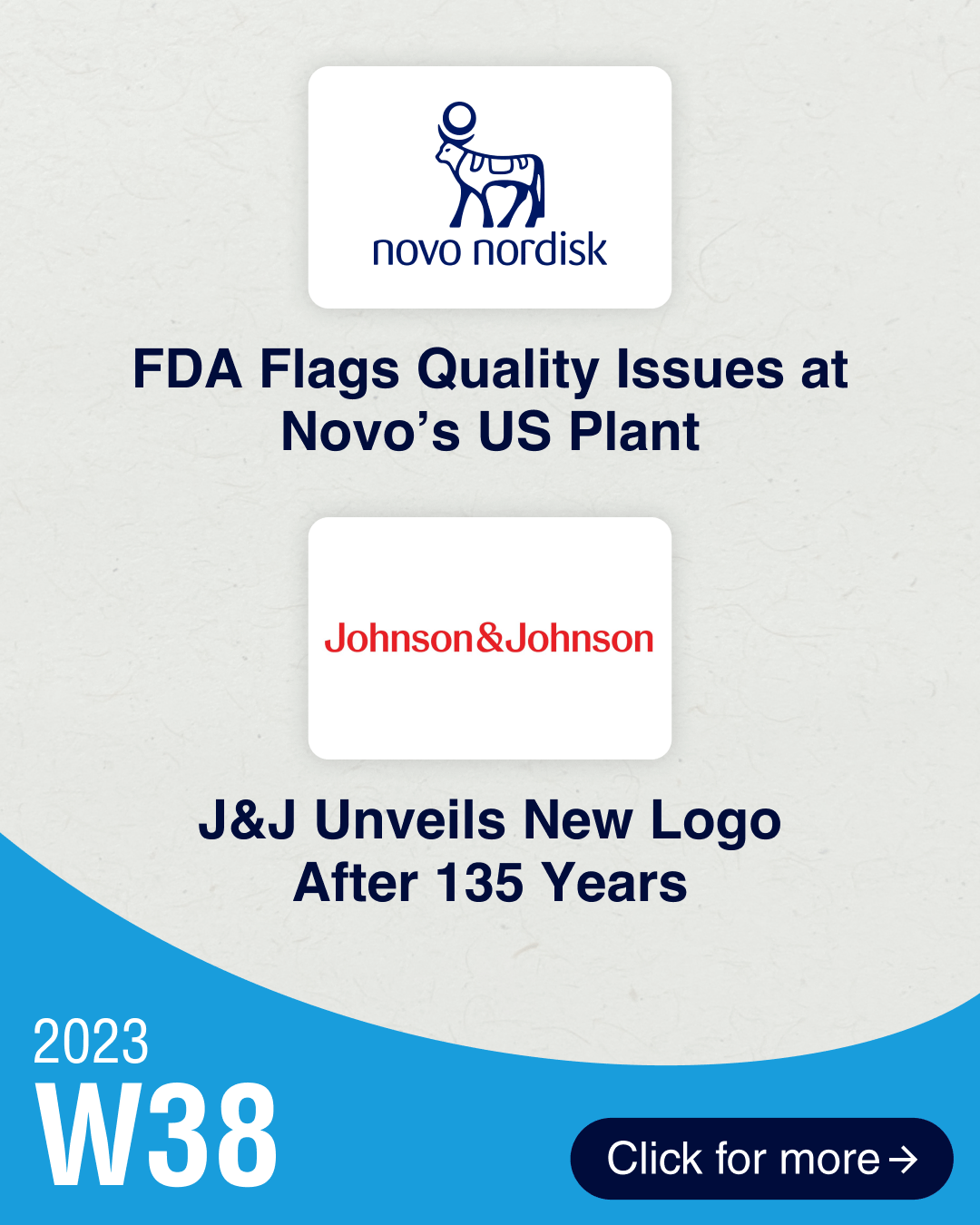
By PharmaCompass
2023-09-21
Impressions: 1,367
The US Food and Drug Administration (FDA) has flagged quality control issues at Novo Nordisk’s Clayton, North Carolina plant. This plant makes active pharmaceutical ingredients (APIs), including semaglutide used in Novo’s popular weight loss drug Wegovy and diabetes drug Ozempic.
Eli Lilly has filed multiple lawsuits against US medical spas, wellness centers and compounding pharmacies for fraudulent sale of non-FDA approved products falsely claiming to contain tirzepatide, the API in its diabetes medication Mounjaro.
Johnson & Johnson has updated its brand and has united its medtech and pharmaceutical segments under its brand name.
In approvals, GSK has received FDA approval for its oral therapy, Ojjaara (momelotinib), for the treatment of myelofibrosis, a rare bone marrow cancer. BieGene’s cancer drug Tevimbra (tislelizumab) has received authorization in Europe as a monotherapy for adults with esophageal squamous cell carcinoma (ESCC) following chemotherapy. Meanwhile, BeiGene has regained full global rights to Tevimbra as it has ended its 2021 agreement with Novartis.
After news about deaths due to contaminated cough syrups, India has decided to make it mandatory for drugmakers to audit their raw material suppliers at least once a year. And, FDA has declined approval to ARS Pharmaceuticals’ nasal spray Neffy, an alternative to EpiPen.
FDA flags quality issues at Novo’s Clayton facility that makes API for Wegovy
For sometime now, Novo Nordisk has been facing supply-side challenges in meeting demand for its hugely popular obesity med Wegovy and diabetes drug Ozempic, both of which contain the API semaglutide. Reuters has now reported that FDA had found lapses in quality control at Novo Nordisk’s Clayton, North Carolina plant, back in May 2022. The Clayton facility produces semaglutide.
According to reports, FDA inspected the plant once again, in July. During both the inspections, FDA found issues with the factory’s control systems to prevent microbial contamination. According to Endpoints News, Novo’s US facility has had at least four quality control issues related to microbes in the past two years. It is not clear how the FDA citations will impact the supply of Ozempic and Wegovy.
In 2022, there were production problems at the Brussels (Belgium) plant operated by its first contract manufacturer Catalent. Novo then took some Wegovy manufacturing into its own hands. Novo has also hired Thermo Fisher to do the filling of Wegovy injections at its Greenville, North Carolina plant.
Meanwhile, Novo Nordisk has hired US private contract manufacturer PCI Pharma Services for assembly and packaging of Wegovy in order to meet its growing demand. Novo has also partnered with Aspen Pharmacare to manufacture insulin on its behalf in South Africa for export to African countries through a government tender initiative.
FDA issues Form 483 to Aurobindo subsidiary: Indian drugmaker Aurobindo Pharma’s subsidiary, APL Healthcare Limited, has received a Form 483 with one observation from the FDA for lapses at its plant in Tirupati in south India.
Lilly files lawsuits over entities selling knockoff Mounjaro in US
Eli Lilly has filed four lawsuits against US medical spas, wellness centers and compounding pharmacies for fraudulent sale of non-FDA approved products falsely claiming to contain tirzepatide, the API in its diabetes medication Mounjaro. The drug was originally approved for treating type 2 diabetes and is exclusively produced and available through Lilly. It has also shown benefit in weight loss. Lilly’s lawsuits seek to halt the distribution of tirzepatide and have sought unspecified damages for alleged violations of consumer protection laws.
GSK bags FDA approval for Ojjaara, its rare bone marrow cancer therapy
GSK has received FDA approval for its oral therapy, Ojjaara (momelotinib), for the treatment of myelofibrosis, a rare bone marrow cancer that disrupts the body’s normal production of blood cells, in patients with anemia regardless of prior myelofibrosis therapy. This makes it the first and only approved medicine for both newly diagnosed and previously treated myelofibrosis patients who have anemia and splenomegaly (enlarged spleen).
EU regulator suggests withdrawal of GSK’s blood cancer drug: The European Medicines Agency’s Committee for Medicinal Products for Human Use (CHMP) has recommended against renewing the conditional marketing authorization granted to GSK’s multiple myeloma drug Blenrep (belantamab mafodotin-blmf). Last year, GSK withdrew Blenrep from the US market, following outcomes of a phase 3 confirmatory trial.
J&J in makeover mode; gets new visual identity after 135 years
Johnson & Johnson has announced a makeover of its iconic signature script, in use since 1887, with a modern design that reflects its enhanced focus on pharmaceuticals and medical devices. The updated look, featuring a different shade of red, signifies J&J's transformation. Its pharmaceutical division will be rebranded as Johnson & Johnson Innovative Medicine, while the medical devices unit will continue to be named Johnson & Johnson MedTech.
FDA rejects approval of first nasal spray alternative to EpiPen
FDA has issued a complete response letter (CRL) to ARS Pharmaceuticals for Neffy, an epinephrine nasal spray, to treat allergic reactions, including anaphylaxis in adults and children weighing 30 kg or more. The agency has requested a study that evaluates repeated doses of Neffy as compared to repeated doses of an epinephrine injection product, specifically under allergen-induced allergic rhinitis conditions, to support its approval. ARS Pharma plans to resubmit the application to the FDA in the first half of 2024.
India mandates annual audit of raw material suppliers by drugmakers
After news of contaminated India-made cough syrups causing deaths of children in The Gambia, Uzbekistan and Cameroon, the country has decided to tighten rules to improve the quality of drugs being manufactured by its drugmakers. India will make it mandatory for drugmakers to audit their raw material suppliers at least once a year. According to a Reuters report, India’s regulator conveyed the decision on mandatory audits for raw material and packaging material suppliers in a meeting with industry representatives held on September 15.
BeiGene’s Tevimbra gets authorized in Europe; terminates deal with Novartis
The European Commission (EC) has authorized BeiGene’s cancer drug Tevimbra (tislelizumab) as a monotherapy for the treatment of adults with unresectable, locally advanced, or metastatic esophageal squamous cell carcinoma (ESCC) following chemotherapy. Additionally, FDA has also accepted the biologics license application (BLA) for tislelizumab, considering it as a potential first-line therapy for patients with unresectable, recurrent, locally advanced, or metastatic ESCC.
Meanwhile, BeiGene and Novartis have ended their 2021 agreement to jointly develop Tevimbra, marking the second such termination in just over two months. BeiGene will regain full global rights to the drug without any royalty payments to Novartis, which will continue its manufacturing.
The PharmaCompass Newsletter – Sign Up, Stay Ahead
Feedback, help us to improve. Click here
Image Credit : Phisper Infographic by PharmaCompass license under CC BY 2.0
“ The article is based on the information available in public and which the author believes to be true. The author is not disseminating any information, which the author believes or knows, is confidential or in conflict with the privacy of any person. The views expressed or information supplied through this article is mere opinion and observation of the author. The author does not intend to defame, insult or, cause loss or damage to anyone, in any manner, through this article.”







